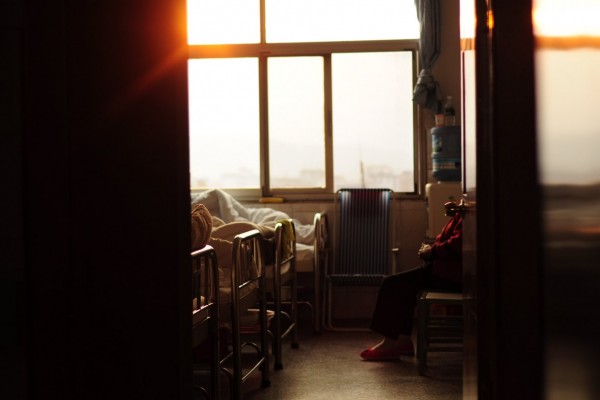Under the shadow of contagion: Abuse of Filipino workers in Alberta’s largest COVID-19 outbreak

The Cargill plant in High River, about 60 kilometres south of Calgary. Photo by Brent Calver.
COVID-19 continues to expose Canada’s capitalist contradictions and the exploitation of workers this country was built on. Indeed, nowhere are the indicators of this disaster more calamitous than in Alberta—the province that, until recently, served as the country’s economic engine feeding commodity markets through beef and oil. The rate of infection, and the workers being infected, demonstrate a disregard for the value of labour and mismanagement by those in power.
On April 20, oil prices fell to unprecedented negative values, the lowest level since 1986, as a result of oversupply, coupled with reduced production, amid a widespread downturn of economic activity in Alberta due to the pandemic.
Meanwhile in the province, the massive Cargill meat-packing plant in High River reported the largest single-site outbreak of COVID-19 in Canada on the same day oil prices fell to record lows. One worker died from the virus and hundreds of others fell ill.
Later that same week in Alberta, the meat plant in Brooks, run by Brazilian multinational JBS, announced it would be reducing production due to an outbreak in their facility. The JBS plant in Brooks, and Cargill’s facilities in High River and in Guelph, Ontario together process over 95 percent of the beef in Canada, according to the National Farmers Union.
Many more plants are struggling to remain open despite significant outbreaks, and experts anticipate rolling closures to disinfect facilities. Meanwhile meat packing workers, most of whom are racialized and vulnerable, keep getting sick. Before the first cases in High River were confirmed, residents of the community wrote a letter to the town mayor stating, “We, the workers and our families, are worried and scared for the possibility that we might bring the virus with us at home,” the CBC reported. The UFCW Local 401, the largest private sector union in Western Canada representing some of the workers at the plant, joined in with the closure call the next day.
The outbreak has been blamed incorrectly on everything other than the employers, from a community conspiracy against authorities to the necessity of workers to carpool. Around 70 percent of workers at the Cargill High River plant, it turns out, are Filipinos; some of whom are recent migrants who were hired through the federal Temporary Foreign Workers (TFW) Program. On social media networks, the imagined stereotype of the strong Filipino work ethic—one that does not let the sniffles get in the way of a hard day’s work—is blamed for the spread of the virus, particularly among paranoid immigration protectionists, buoyed by conservative pundits. The spread of this racist stereotype also makes the assumption that brown folks, coming from poorer communities, are immune to illnesses. A number of calls for racial justice and representation have attempted to correct these hurtful mistruths, but even these responses tend to focus only on questions of how the virus is perceived in the cultural sphere. There are more brutal dynamics at play that lie obscured beneath the media frenzy.
Typically, community members are housed in multi-family dwellings, due to the cost of living and lack of supports, where it is difficult for a sick person to isolate themselves.
Many meat plant workers live with their partners or other household members who work at long-term care facilities, where the explosive spread of COVID-19 has sickened and killed the most vulnerable.
Inside Cargill’s High River meat-packing plant before the COVID-19 pandemic. Photo: Cargill.
“These are workers who came to Canada to work through official channels, and then saw the rules governing their status changed with absolutely no consideration of them or their circumstances,” says Luciano, who also directs Migrante Alberta, an advocacy and self-help organization for migrant workers. “They’re not looking for special treatment. They just want to work, provide for their families, and be able to fully participate in the communities where they live.”
Despite new company commitments to contact tracing of COVID-19, there is still little concern for vulnerable meat packing workers, who are considered expendable by their employers. Workplace health and safety were watered down by the government just before the pandemic outbreak. Employees at the Cargill plant in High River called out the lack of protective equipment and alleged that, for two crucial weeks, the company provided masks to managers, but not to production workers. “Attendance bonuses” were also provided by the company as incentives for employees to come to work even when they were sick, putting everyone at the plant in danger.
Cargill’s High River facility processes over 4,500 cows daily. (That’s 2.25 cows per employee, assuming all 2,000 employees work every day. If 400 employees are self isolating, that number increases to 2.81 cows per employee.) The same facility at the centre of Alberta’s largest COVID-19 outbreak is set to reopen on May 4 after a two-week shutdown. The Cargill meat-processing plant will operate with one shift per day when it resumes operations, the company said on April 29.
Alberta’s outbreaks illustrate the fragility of an industrial food system focused on massive production, efficiency and foreign capital ownership. Similar circumstances are being reported in the United States.
The American Cargill company already touches most of what ends up on a family’s dinner plates. With its headquarters in Minneapolis, Minnesota, Cargill is the world’s largest private company, according to Forbes, whose primary drive for profit for the past 153 years has been commodities trading—processing, trading, exporting and handling millions of tons of wheat, corn, soybeans, beef, pork and poultry, among other agricultural products. JBS is a Brazilian corporation, which processes 13 million animals daily into meat and has annual revenue of $50 billion USD making it the world’s largest meat company by sales. These two foreign-owned companies completely dominate Canada’s beef sector.
The contagion is bad enough; the lack of humanity and compassion towards the super-exploited working class makes it worse.
If Chief Public Health Officer Theresa Tam expects to see companies embrace a “new normal” when people return to work, then it is hard to imagine private capital turning a profit when public health and worker security has to be provided. We therefore cannot return to the same type of working environment that existed before the pandemic.
If we are to exit the global economic depression brought about by the pandemic with a restructuring of society into a more egalitarian and ecologically sustainable framework, it will take more than tweaks and self-regulation. It will have to involve more careful analysis of capitalist dynamics and the social relations of production. The catastrophe among Alberta’s Filipino community demonstrates that need. This marginalized community, currently living under the shadow of the contagion, must be seen and heard if we are to build a fully equal society after the pandemic.
Richard Wolff provides an alternative vision of what this could look like: “A worker-coop based economy—wherein workers democratically run enterprises, deciding what, how and where to produce, and what to do with any profits—could, and likely would, put social needs and goals (like proper preparation for pandemics) ahead of profits.”
If we could be so bold, this vision of the “new normal” must be embraced.
Ysh Cabana is a writer and community organizer living in Toronto. He is also a member of BAYAN-Canada, alliance of progressive Filipino groups.










